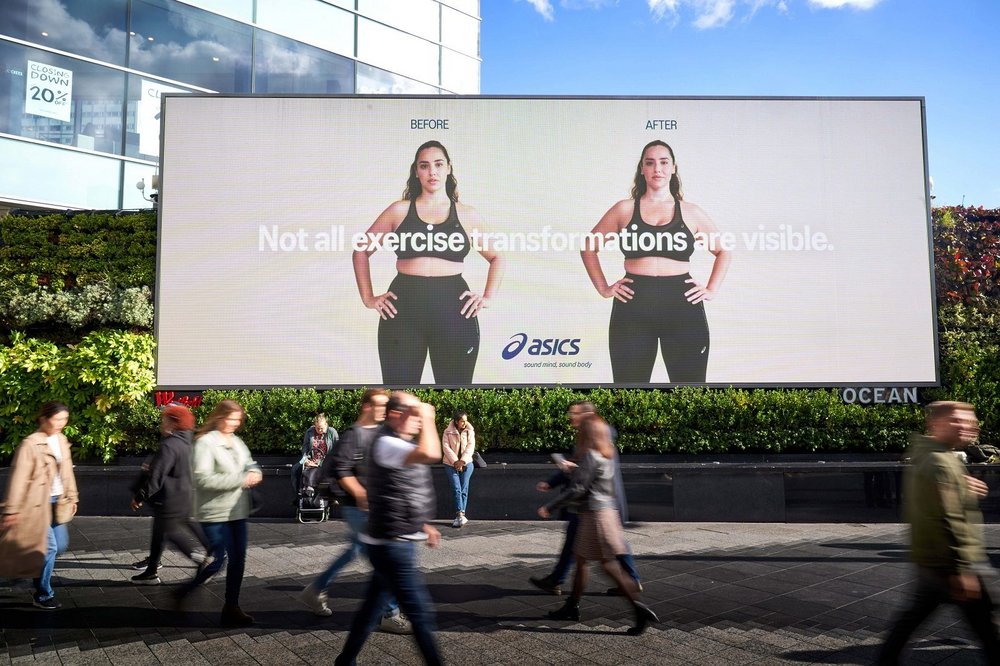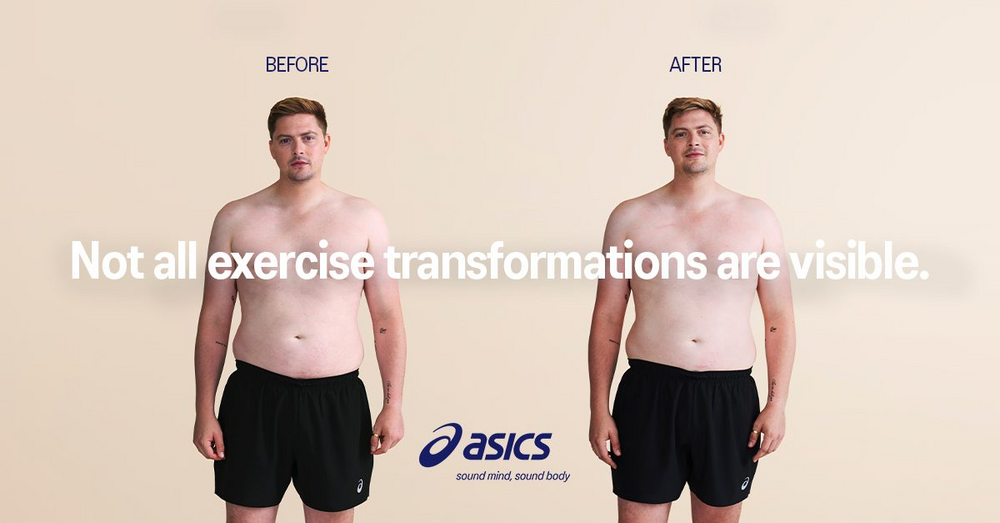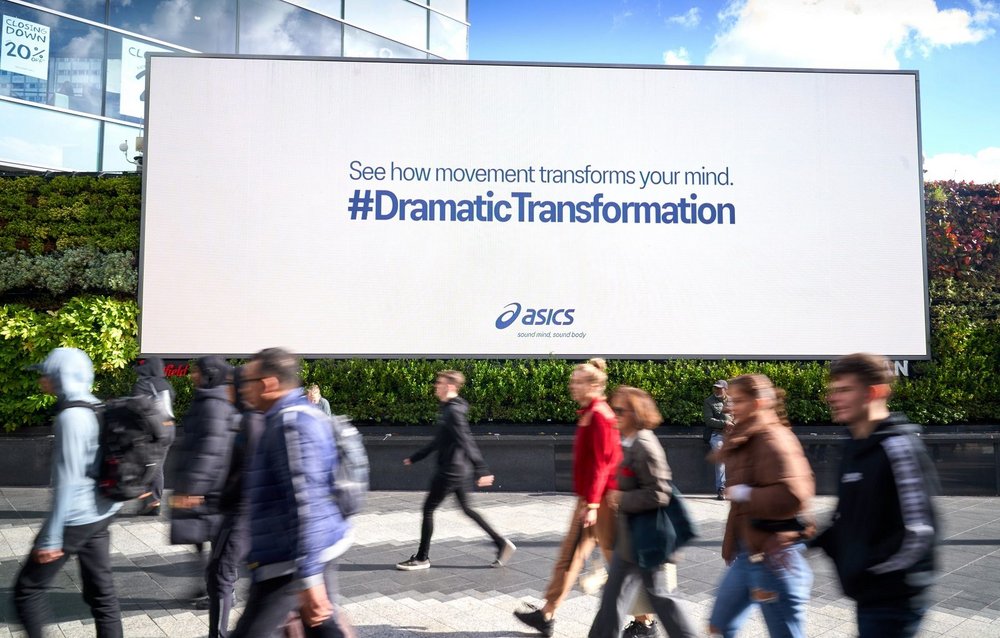Campaign of the Week
No gains but less pain: Asics touts emotional benefits of exercise /
Sportswear brand subverts body transformation photos to promote therapeutic effect of exercise

In the era of social media it is harder than ever to avoid unrealistic body standards, with the ability to tweak selfies warping the reality of what beauty looks like – some people are even getting plastic surgery to get the perfect ‘Instagram face’, while ‘before and after’ body transformation photos are rife on social channels.
But research suggests that, while exercise is in itself a positive thing, the pressure to stay ‘fit’ and showcase bodily gains on the likes of Instagram can negatively impact physical and mental health.
Inspired by this insight, sports brand Asics launched the Dramatic Transformation campaign on World Mental Health Day (10 October), working with agency Golin, London, and mental health charity Mind.

The brand photographed Love Island’s Alex George, Strictly Come Dancing’s Motsi Mabuse and body confidence influencer Jada Sezer before and after a short workout. The exercise lasted precisely 15 minutes and 9 seconds, as according to an Asics study, that’s how little time it can take to lift one’s mood through movement. While the participants’ appearances were obviously unchanged, each looked ostensibly happier, showing that not all worthwhile transformation is physically noticeable.
Asics ran the photos across OOH, digital and social, targeting places where exercise photos were likely to be featured, such as gyms, men and women’s health titles and social media. The UK-based initiative will also run throughout Germany, France, Sweden and the Netherlands.
The three influencers also featured in a film on Asics’ YouTube channel, where they discuss the damaging effect of body transformation images on people’s self-esteem and how working out improves their mental health.
Results / According to the agency, the campaign generated a 22% increase in share of mental health media coverage in comparison with competitors, and a 14%. increase overall. It also generated a 57% spike in mentions of Asics in relation to mental health in the first few weeks of the campaign.

Contagious Insight /
Wellness marketing / Asics could have applied itself to depict the new performative heights accessible to their consumers through physical training. Except people don’t need reminding that exercising is good for them. In fact, it’s safe to say that they’re pretty obsessed with keeping fit. This fixation is reflected in the numbers, with the fitness industry predicted to be worth $131.9bn by 2028. The phenomenon is such that historian Jürgen Martschukat has declared that we live in The Age of Fitness.
But Asics’ research points out that our preoccupation with being in shape isn’t without problems. The study reveals that 73% of Brits think that the societal focus on the perfect body has a negative impact on their mental health – what’s more, body transformation photos demotivated 80% of respondents and made 48% feel insecure about the way their body looks. In light of these findings, the Dramatic Transformation campaign stands as both a striking visual reminder of the psychological benefits of exercise and a healthy incentive to hit the gym.
Also, portraying influencers before and after a single workout allows Asics to turn the body transformation phenomenon on its head into something inspirational and fit (pun intended) for the times. Asics’ transformation photos shift the focus away from aesthetics and towards mental health at a time when consumers care hugely about wellbeing and the wellness sector is booming. By setting itself up as an antidote to the damaging effects of gym culture on mental wellbeing, Asics makes itself relevant in a way that ties into people’s growing appetite in everything wellness-related, a topic we cover at length in our Wellness Marketing trend.
Legitimate voice / With the plethora of actors that operate in the sportswear category, finding a distinctive positioning is crucial to stand out. But it’s no easy task. This is especially true with the sector flooded with long-standing brand messages about performance, creativity and perseverance. Recently, Asics has focused instead on mental wellness and fortitude – the brand’s original purpose and overall mission (Asics is an acronym that stands for the Latin Anima Sana in Corpore Sano – ‘a healthy mind in a healthy body’). For example, in 2019, it created Eternal Run, a race with no pre-determined route or finish line. Jamie Cordwell, executive creative director at Edelman UK, explained the campaign’s ethos to Contagious: ‘Showing someone running around a racetrack for two hours to set a record is interesting, but what really matters to people is their own finish lines, their records and their achievements.’
Dramatic Transformation builds on this idea of exercise as a force for good, adding to its credentials by choosing contributors that are recognised faces in the body positivity space. It also made sure it acted in accordance with what it preaches: Asics EMEA has pledged to ban exercise transformation photographs that focus purely on aesthetic transformation on its channels.
Want more of the same? /
We don’t just write about best-in-class campaigns, interviews and trends. Our Members also receive access to briefings, online training, webinars, live events and much more.






